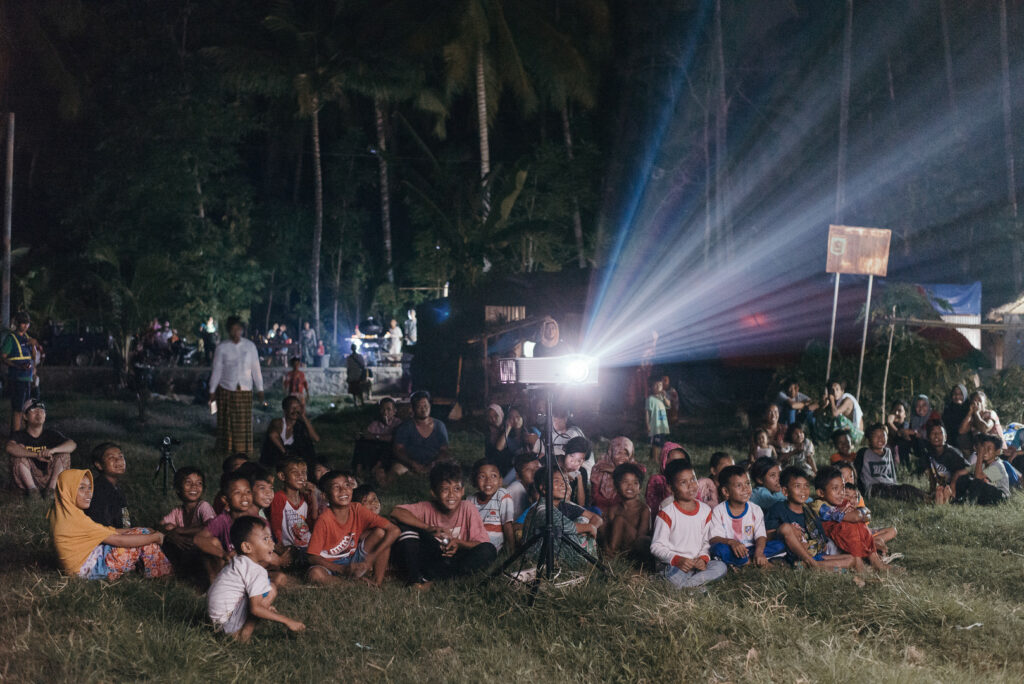A few months ago, a dainty cinema in the alleyways of old Denpasar provided me with a momentary escape from the mundane routine of a semi-lockdown in oddly-scanty, tourist-free Bali. A few weeks ago, I had the opportunity to have a virtual conversation with the two people behind the creative space and numerous other projects – Cika and Edo. From talking about the importance of arthouse cinema and short films to the ebb and flow of opening a cinema in the midst of a pandemic, in this interview, the two film enthusiasts talk about their experience working as distributors of the art form in Indonesia.
Fransiska Prihadi, who goes by the nickname Cika, and Edo Wulia are film distributors who also play various roles across several film-related platforms. In the annually-held short film festival Minikino Film Week, Edo acts as the director of the festival and Cika as the program director, as well as a curator for the shorts fiction category in the national Indonesian Film Festival Awarding Award (2019-2020). Whereas in Micro Art Shop House, MASH Denpasar, the two are founders of a cozy micro-cinema, with a dorm for artist residency. As a character of many interests, Cika has a background in Architecture and still does some architecture projects alongside her film-related activities, whereas Edo arrives from an educational background of fine arts.

How did you get into working as a film distributor in the first place? At any point did you ever consider jumping into production as well?
Edo: My relationship with Minikino started when I joined the festival as a volunteer back in 2003, however, to talk about my relationship with film itself, it would date back to my childhood. Growing up, I spent my days going to the cinemas and relishing the experience of watching films in a communal setting. As I became more involved in Minikino, I grew to become fond of meeting filmmakers, for they are visionaries and dreamers – they may not always have the money *laughs*, but they truly are fascinating dreamers. With that, I never had the desire to jump into production, instead I was keener on finding ways to help deliver these films in the best form to the audience, through exploring the more technical sides of exhibiting films.
Cika: My interest in film also started by being a keen moviegoer. Back in 2000, there was a festival called JiFFest Jakarta International Film Festival, and I remember having to maneuver my architecture uni work schedule around the festival schedule, so I could go. Then in 2008, I went to Minikino as a festival goer, and it was in 2013 when we (Minikino) had the chance to collaborate with Sweden that I realised that my thinking framework as an architect could be beneficial to managing a festival. From here, I started to become more involved with the programming aspect of the festival. I was involved in production several times, however, this was largely motivated by wanting to know what are the issues that are faced within production, and often the main issue has to do with, again, distribution. Thus why at Minikino, our focus is clear: dissemination, distribution and exhibition. There is a clear challenge there, hence it is fitting for us to take care of that end of the chain because the cost of improper distribution is losing an array of great filmmakers and great films.
What is it in particular about arthouse cinema and short film that initially drew you towards it?
Edo: Well, I love short films because it doesn’t waste time, and yet could achieve an impact on par with any other great film in other formats, a good short film is definitely not less in value compared to a good feature film.
I like arthouse films because it is not something that you can find in commercial cinemas, I always think of arthouse movies as artisan food in the midst of big commercial fast-food chains. To me, the way commercials films are made is like a franchise, it will work because they have a “set recipe” that would just make it in the market, and I enjoy these commercial movies as well: Pixar and Marvel Studios are great, their pictures are dazzling, and yet we still need to taste artisan food, with a personal touch attached to it. In these films, the filmmaker made the movies out of love for the personal, local topic that they are about to share, instead of chasing a blockbuster status. However, both types of films need to coexist to keep diversity in the scene.
Cika: The communal format of watching film and cinematic experience itself is questioned when in fact not all films can enter a commercial theatre. It is very difficult for, let’s say, personal documentaries to be catered in a commercial theatre, this then raises the question: why can’t there be a cinema in which all these movies can still be distributed? Being connected to the Image Forum Festival (the oldest and largest experimental and arthouse festival in Japan) gave me the confidence that arthouse cinema is important to the ecosystem of cinema in general.
You talked about how arthouse cinema can give room for more personal issues to be brought up by filmmakers. What are some issues that are prominent in Indonesian arthouse or short film scenes lately?
In arthouse or through short films, filmmakers often use this freedom to “destroy” the constraints of genres by blurring the boundaries that are already established.
Edo: This is one of the appeals of arthouse cinema, there are endless and diverse topics that are brought up, when in commercial movies they always go back to love or action as a repeated genre. In arthouse or through short films, filmmakers often use this freedom to “destroy” the constraints of genres by blurring the boundaries that are already established, often so much so that one may ask, is this an art film or porn?
Cika: Talking about this confusion between “is this an art film or porn” reminded me of how in Japan, there have been programmes made to preserve and promote classical Japanese films including pink films / roman porno which was produced by Nikkatsu production house (who produced many of Japan old pink films). This whole blurring of genre at the time helped female directors to enter the industry, and could be seen as somewhat of a feminist movement these days?
Edo: But back to issues that are prominent these days, we still see different filmmakers’ perspectives on the 1965 political turmoil, issues surrounding the LGBTQ community, and human rights issues in general.

What do you think is hindering these issues from being brought up in commercial cinema?
Edo: Maybe as simple as it won’t sell in big commercial screens, but then again that might not be the biggest reason, rather the censorship regulation in Indonesia which until today still has no clear standards and is easily triggered by any films which brought up sensitive and highly undisclosed issues such as Indonesian politics.
How are your experiences in opening a cinema in the midst of a pandemic?
Cika: This is a funny question because just 30 minutes ago I was chatting with several managers of short film conferences in different parts of the world and we were updating each other with the situation of cinema in the midst of COVID-19. But operating in the midst of the pandemic, at the early stage was very nerve-wracking, because of the lack of information that we had regarding the virus itself. On the other hand, our festival had to be held offline as it was much more difficult to arrange an online festival (getting the consent of filmmakers and deciding which platforms to use) and our goal as a festival is to reach out to local audiences, 90% of our screenings are held in places with no cinema available. However, luckily we were supported by the Ministry of Tourism and Creative Economy alongside the government’s cultural facilitation body, and to us, this shows that an offline festival is feasible. But of course, we had to obey the safety measures, we had to do data tracking and wait two weeks after the festival ended in order to ensure that no one got infected. Since December, we have been closed because of the semi-lockdown state, but we are sometimes open for private screenings and online events.
During this pandemic as cinemas temporarily close down, many have switched to streaming platforms instead. How do you view this new phenomenon of the craze for streaming, and do you stream yourselves?
Edo: If we simply do not have the chance to watch a movie on a big screen, then we have no power and should watch it through the small screens, however for me personally, as long as there is a choice to go to the cinema, I would much rather go to a cinema. If we look back, the film industry in Indonesia faced a decline when television and home videos entered the market, that’s why in the 80s, out of the preference of people to watch films at home, the numbers of people going to the cinema fell and cinemagoers became even more segmented. But I still prefer going to the cinema as I do think that watching a film together on a big screen offers a totally different experience. The act of watching under a communal setting itself makes where we watch a movie and whom we watch it with has its own significance.
Cika: To me, the prospect of Netflix is scary, because I know that I will enjoy it. But no, I don’t use it because at this point I have too many films that I have to watch! And if I do have spare time, I would probably use it to read books instead. But if I’m talking about Minikino, or Bioskopan then the answers are different. As Bioskopan, no, we are not interested in venturing into the online realm as our focus again is to provide a “cinema-like” experience, so it has to be screened physically in an arthouse cinema. But if we’re talking about Minikino, if we do get a screening budget for filmmakers, we do accept the possibility of online screening. There have been a few requests to make a certain program online via streaming, so we don’t close ourselves to such an opportunity. We will always be on the filmmakers’ side, so we need to ensure that they gain an extra benefit from these online screenings.
Time passed so quickly when I had the conversation with the two of them, and without noticing all the questions I had in mind had been ticked off from the list. But as the 30th of March marks the National Film Day in Indonesia, I asked both Edo and Cika to name a couple of their favorite Indonesian short films.
Edo: Hmm for me, I always liked all the nominees and winning films in Minikino film week, so you can go to the website and check the list (laughs).
Cika to Edo: But that’s a lot!
Edo: Then just look at the winners, I like all of those.
Cika: I have a prepared answer for this (laughs), they’re rather old films I just realised. I have three: Sugiharti Halim, Violence against Fruits, The Fox Exploits The Tiger’s Might, and I just realised again at this moment as I was saying all these titles that these are all films about Chinese Indonesians. I think these are all amazing films and contribute to why again I love short film in the first place, as it has the ability to give people a path towards self-reflection and rooms for discussing issues that would simply not have been heard of in commercial films.
To Cika and Edo, thank you for the time that you have kindly spared and the insights you have shared with us.
Cover image: Unsplash
Edited by: Debby Mogot





